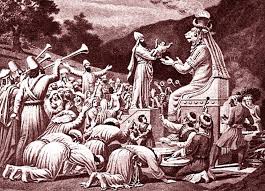Deuteronomy 18:10, One who causes his son or daughter to pass through the fire. This was done in honor of the Canaanite deity Moloch (see Lev 18:21 and 20:1–6). The name moloch in Hebrew means “king” with the root of the word meaning “to rule or reign.” Child sacrifice (the ancient form of modern abortion/infanticide), though a pagan practice that
YHVH abhorred, was practiced by both houses or kingdoms of Israel as they drifted into syncretism with the heathen cultures around them (see 1 Kgs 11:7; 2 Kgs 16:3; 21:6; 23:10,13; Jer 7:31; 19:5; Ezek 16:20; 23:37). Baal appears to be a synonym of Molach (see Jer 19:5 and the Ency. Britan. eleventh edit., vol. 18, p. 676). The dead bodies of sacrificed children were thrown into the garbage dump of the Valley of Hinnom or Tophet just below the Temple Mount in Jerusalem (Jer 7:31; 19:5–6). Apparently, the children were not burned alive, but were slain (by knife) like any other sacrifice before being thrown into the fire and then into the garbage dump (Ibid.). The ancients sacrificed their children to appease their bloodthirsty gods of prosperity, sensuality and fertility (The Story of Civilization, vol. 1, by Will Durant, pp. 66–67, 297). 
What can we learn from these random pieces of information concerning the ancient practice of child sacrifice? It was done in honor of their deity; in other words, their idol was the king that ruled their lives. What is the chief deity in modern America and most everywhere else in the world? Money and wealth? Sex and pleasure? Fun and entertainment? In ancient times, children were killed by a knife, thrown into the fire and then into the garbage dump. Today, what happens in America? Parents abort their babies or have them murdered while being born (partial birth abortion) by using burning solutions to kill the baby in the womb and scalpels and scissors to hack the baby to pieces to aid in its extraction. Afterwards the dead baby is placed in a dumpster.
What reasons do parents give for killing their children? “It will cost too much to raise them and it’s too much trouble” (greed, hedonism and selfishness). “It will interfere with my career” (greed). “I want to have pleasure without responsibility” (hedonism and greed). Regardless of the excuses, the reasons today are the same as those of the ancients: prosperity, greed, hedonism and so on. Are we any different or any more “civilized” than the ancients? YHVH called abortion an abomination (which means “disgusting, abominable, abhorrent, detestable or loathsome,” Deut 18:12). Do you abhor that which YHVH calls an abomination? In Scripture, does YHVH call children and fertility a curse … or a blessing? (See Deut 28:11, Ps 127:3–5.)
Deuteronomy 18:15, A prophet from your midst, like me, shall YHVH your Elohim raise up for you. Obviously, this was fulfilled in the person of Yeshua the Messiah. The non-believing Jews, however, attempt to prove that this verse does not apply to Yeshua. For example, The ArtScroll Stone Edition Chumash in its commentary states, “Moses told the nation that just as he was one of them, so God would designate future prophets [plural] from among the people to bring them his word” (p. 1033, emphasis added). What is wrong with this statement? Is the verse quoted accurately? Moses said “prophet” singular, not “prophets” plural, as the commentary says. So in this manner, the Jewish commentators switch the focus off of one single prophet who would arise, and make it appear as if all the prophets recorded in the Scriptures helped to fulfill this prophecy. This is dishonest biblical interpretation.
On another note, does the “Jesus” of the mainstream church who, it is taught by many church leaders, broke the Sabbath and came to do away with the Torah-law of Moses fulfill this prophecy? Didn’t Moses say that the prophet would speak only the words that Elohim would give him (and the implication is that those words would not contradict what was given at Mount Sinai)? So did Yeshua come to do away with the Torah-law or not? (Read Matt 5:17–19.) In commissioning his disciples in Matthew 28:20, didn’t Yeshua tell them to do and to pass on to others all that he had commanded them? Didn’t Paul tell us to, “Follow me as I follow the Messiah” (1 Cor 11:1)? So how is it that so many people in the mainstream church believe otherwise about Messiah Yeshua and Paul relative to their teachings on the Torah-law? The point we are trying to make here is that the “Jesus” of the Sunday church who, it is taught, came to annul the Torah, does not fit the criteria of this prophecy of Deuteronomy 18:15–19. Either the Torah prophecy is wrong and church tradition is correct or it is the other way around. We choose the former (that Yeshua and Paul upheld and validated the Torah to be the truth and to be applicable to the believer’s life), not the latter (that they came, in essence, to invalidate and abrogate it)!


Shalom Natan & All
I have a difficulty understanding the case of the Jewish mamzer.
I have understood that the person who was from a union not approved of by God was not able to be part of the congregation of Israel and was despised and no help was to be given in the bringing up of the child to discourage illicit unions and then I read about Japtheth who become a judge for Israel as a bastard child of the union with a prostitute.
Sometimes, could it be a misplaced social pressure that makes abortion seem the best solution in these things and not just a monetary or hedonistic gain either?
Like the mamzer pressure? It seems Japtheth was ‘aborted or murdered metaphorically’ as a young man by his half brothers when they drove him off so they would not have to share inheritance until God stepped in too. To be a merciful judge that is righteous is a great wisdom.
Blessings. FJ
To properly understand certain difficult scriptures, we must view them from Elohim’s perspective, and not the human one. Let me explain. In Scripture, YHVH lays out his perfect will for humans, yet how often do humans perfectly follow YHVH’s perfect will? If YHVH were waiting for a perfect human to come along who he could use to accomplish his purposes, his plans wouldn’t get done would they? So YHVH in his mercy and grace has to use flawed vessels. His will and purposes will go forward regardless of imperfect humans, and this means that some of these vessels will be extremely imperfect.
Romans 12:2 talks about the good, perfect and acceptable will of Elohim. YHVH sets forth his perfect will for humans in his Torah. When humans follow it, they will be blessed. To the degree that they don’t follow it, they will be less blessed or not blessed at all. It’s a matter of degrees. The law of the mamzer is an example of the perfect will of Elohim. When Jepthah came along, Israel was in apostasy. Jepthah was the imperfect vessel that YHVH used. Perhaps he was the least flawed of those who were willing to step forward to obey Elohim. In any case, flaws and all, YHVH used him and he’s even listed in Hebrews 11 as a man of faith. As imperfect as he was, he was not lukewarm. This was to his credit, and YHVH recognized it as such.
There for the mercy and grace of Elohim go each of us!
Personally, I can’t see any connection to this subject and the biblical case against abortion.
Thanks Natan
the link from my perspective is that some people may abort a pregnancy because the relationship is unapproved & they do not get social support.
With Jepthath his father must have taken responsibility for the bringing up of the baby, in spite of mamzer status.
Also I do in no way agree with abortion as the answer to our sinfulness but was looking at it in how the flesh may react to the potential social rejection & how then and now we can’t overcome the fact of the consequence of sin.
Have a good week.
FJ
I was just reviewing my notes on the mamzer in my personal Bible commentary, I realize that when I addressed your question about the mamzer, I had forgotten something. Deut 23:2 is referring to a child of incest, NOT to a child who is born illegitimately. Therefore, Jepthah can’t be considered to be a mamzer. It is a common misunderstanding to apply the term “mamzer” too a child born out of wedlock. In reality, Deut 23:2 shows YHVH’s strong disapproval of any kind of incestuous relations, while at the same time it, by implication, upholds the sanctity of the traditional family unit along with proper sexual relations only between a husband and wife. This, of course, flies in the face of those in our day who would define “family” and “marriage” as just about anything they want it to be.
Thanks very much Natan. When I read about the ‘mamzer’ it was spoken of it terms of illegitimacy and had no reference I can recall to incestuous relations creating a child being the cause of this status.. This is significant and shows Elohim’s disdain of such activity being deeply sinful and repulsive to have such a response written for our instruction. Be blessed. Gratefully FJ
Your last sentence seems like it needs clairifying:
“We choose the former [ ________?] to be the truth, and not the latter [ __________?]!”.
You choose what over what?
The former is what I said earlier in the paragraph that Yeshua and Paul taught about the Torah as opposed to what the church teaches today. However, to insure that this point is not lost, I rewrote the sentence as follows:
“We choose the former (that Yeshua and Paul upheld and validated the Torah to be the truth and to be applicable to the believer’s life), not the latter (that they came, in essence, to invalidate and abrogate it)!”
y came, in essence, to invalidate and abrogate it)!